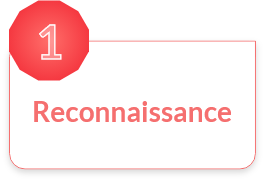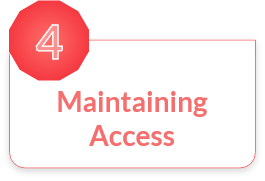CERTIFIED ETHICAL HACKER
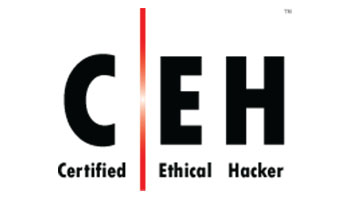
THE ULTIMATE ETHICAL HACKING COURSE
Demanded by Employers, Respected by Peers.

Target Audience
Ethical hackers, Auditors, System Administrators, Web managers, Network Administrators and Engineers, Security Professionals in general.
Course Details
5-Day, 40-Hour Program
Over 340 Technologies and Tactics.
Access over 140 live virtual lab
activities on the most current exploits.
Access over 2,200 hacking tools.
Certification
The C|EH exam can be challenged post the completion of attending the complete official C|EH course. Candidates that successfully pass the exam will receive their C|EH certificate and membership privileges.
Complete Package USD $720
CERTIFIED ETHICAL HACKER PROGRAM
This course in its 10th iteration is updated to provide you with the tools and techniques used by hackers and information security professionals alike to break into any computer system. This course will immerse you into a “Hacker Mindset” in order to teach you how to think like a hacker and better defend against future attacks. It helps you learn the contents with a hands-on training environment employing a systematic ethical hacking process. You are constantly exposed to creative techniques of achieving optimal information security posture in the target organization; by hacking it! You will learn how to scan, test, hack, and secure target systems.
The course covers the Five Phases of Ethical Hacking, diving into Reconnaissance, Gaining Access, Enumeration, Maintaining Access, and covering your tracks. The tools and techniques in each of these five phases are provided in detail in an encyclopedic approach and absolutely no other program offers you the breadth of learning resources, labs, tools, and techniques than the C|EH v10 program.
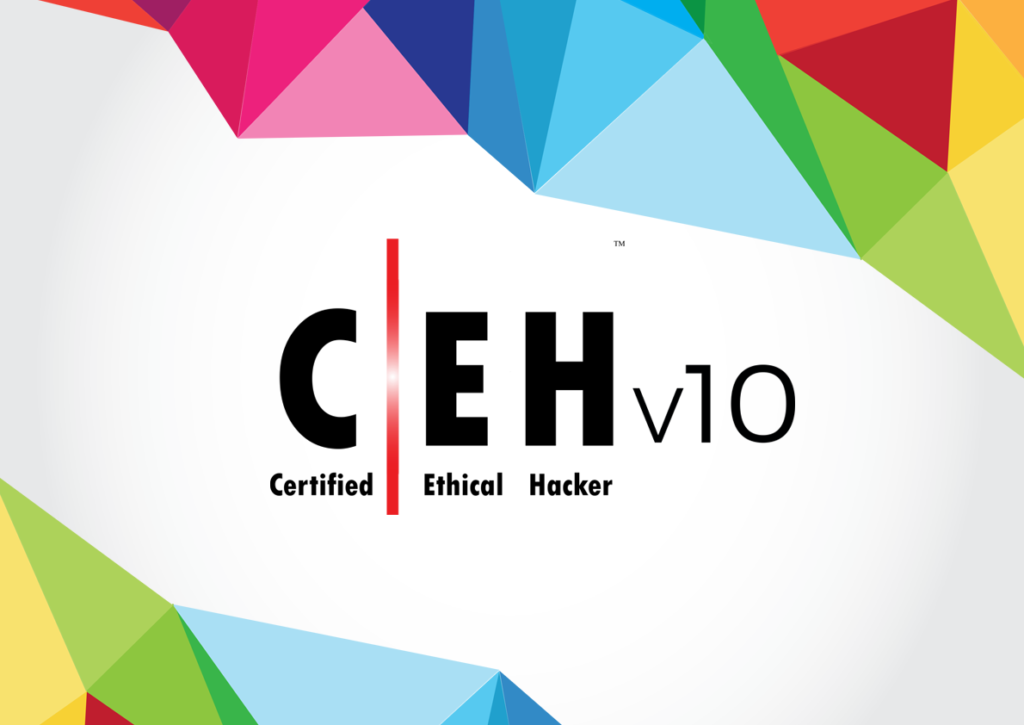
The Certified Ethical Hacker program is the most comprehensive Ethical Hacking program in the world. It is the first of three courses within our Vulnerability Assessment and Penetration Testing (VAPT) track.
More about CEH v10
The Certified Ethical Hacker (CEH) is a core training program for an information security professional, also referred to as a white-hat hacker, who systematically attempts to inspect network infrastructure with the consent of its owner to find security vulnerabilities which a malicious hacker could potentially exploit.
The course helps you assess the security posture of an organization by identifying vulnerabilities in the network and system infrastructure to determine if unauthorized access is possible.

EC-Council’s cybersecurity programs and credentials are organized into tracks to allow professionals to specialize in a particular domain or gain advancements with added recognition and skills, one after the other. This program will train you on the most advanced tools and techniques used by black and grey hat hackers alike to break into an organization to assess, document, and remediate vulnerabilities from a vendor-neutral perspective. CEH will put you in the driver’s seat of an interactive, hands-on learning environment that challenges you to test the integrity of systems and networks by hacking them!
C|EH is used as a hiring standard and is a core sought after certification by many of the Fortune 500 organizations, governments, cybersecurity practices, and a cyber staple in education across many of the most prominent degree programs in top Universities around the globe. Hundreds of Thousands of InfoSec Professionals, as well as Career Starters, have challenged the exam and for those who passed, nearly all are gainfully employed with successful careers, but the landscape is changing. Cyber Security as a profession is evolving, the barrier to entry is rising, the demand for Skilled Cyber professionals continues to grow, but it is being refined, demanding a higher level of skill and ability.
CEH’s 5 Phases of Ethical Hacking
Top Critical Benefits of C|EH v10

C|EH v10 Course Outline
Ethical Hacking and Countermeasures
Information Security Overview
Information Security Threats and Attack Vectors
Hacking Concepts
Ethical Hacking Concepts
Information Security Controls
Penetration Testing Concepts
Information Security Laws and Standards
Footprinting Concepts
Footprinting through Search Engines
Footprinting through Web Services
Footprinting through Social Networking Sites
Website Footprinting
Email Footprinting
Competitive Intelligence
Whois Footprinting
DNS Footprinting
Network Footprinting
Footprinting through Social Engineering
Footprinting Tools
Countermeasures
Footprinting Pen Testing
Network Scanning Concepts
Scanning Tools
Scanning Techniques
Scanning Beyond IDS and Firewall
Banner Grabbing
Draw Network Diagrams
Scanning Pen Testing
Enumeration Concepts
NetBIOS Enumeration
SNMP Enumeration
LDAP Enumeration
NTP Enumeration
SMTP and DNS Enumeration
Other Enumeration Techniques
Enumeration Countermeasures
Enumeration Pen Testing
Vulnerability Assessment Concepts
Vulnerability Assessment Solutions
Vulnerability Scoring Systems
Vulnerability Assessment Tools
Vulnerability Assessment Reports
System Hacking Concepts
Cracking Passwords
Escalating Privileges
Executing Applications
Hiding Files
Covering Tracks
Penetration Testing
Malware Concepts
Trojan Concepts
Virus and Worm Concepts
Malware Analysis
Countermeasures
Anti-Malware Software
Malware Penetration Testing
Sniffing Concepts
Sniffing Technique: MAC Attacks
Sniffing Technique: DHCP Attacks
Sniffing Technique: ARP Poisoning
Sniffing Technique: Spoofing Attacks
Sniffing Technique: DNS Poisoning
Sniffing Tools
Countermeasures
Sniffing Detection Techniques
Sniffing Pen Testing
Social Engineering Concepts
Social Engineering Techniques
Insider Threats
Impersonation on Social Networking Sites
Identity Theft
Countermeasures
Social Engineering Pen Testing
DoS/DDoS Concepts
DoS/DDoS Attack Techniques
Botnets
DDoS Case Study
DoS/DDoS Attack Tools
Countermeasures
DoS/DDoS Protection Tools
DoS/DDoS Penetration Testing
Session Hijacking Concepts
Application Level Session Hijacking
Network Level Session Hijacking
Session Hijacking Tools
Countermeasures
Penetration Testing
IDS, Firewall and Honeypot Concepts
IDS, Firewall and Honeypot Solutions
Evading IDS
Evading Firewalls
IDS/Firewall Evading Tools
Detecting Honeypots
IDS/Firewall Evasion Countermeasures
Penetration Testing
Web Server Concepts
Web Server Attacks
Web Server Attack Methodology
Web Server Attack Tools
Countermeasures
Patch Management
Web Server Security Tools
Web Server Pen Testing
Web App Concepts
Web App Threats
Hacking Methodology
Web App Hacking Tools
Countermeasures
Web App Security Testing Tools
Web App Pen Testing
SQL Injection Concepts
Types of SQL Injection
SQL Injection Methodology
SQL Injection Tools
Evasion Techniques
Countermeasures
Wireless Concepts
Wireless Encryption
Wireless Threats
Wireless Hacking Methodology
Wireless Hacking Tools
Bluetooth Hacking
Countermeasures
Wireless Security Tools
Wireless Pen Testing
Mobile Platform Attack Vectors
Hacking Android OS
Hacking iOS
Mobile Spyware
Mobile Device Management
Mobile Security Guidelines and Tools
Mobile Pen Testing
IoT Concepts
IoT Attacks
IoT Hacking Methodology
IoT Hacking Tools
Countermeasures
IoT Pen Testing
Cloud Computing Concepts
Cloud Computing Threats
Cloud Computing Attacks
Cloud Security
Cloud Security Tools
Cloud Penetration Testing
Cryptography Concepts
Encryption Algorithms
Cryptography Tools
Public Key Infrastructure (PKI)
Email Encryption
Disk Encryption
Cryptanalysis
Countermeasures
What will you learn?
- Key issues plaguing the information security world, incident management process, and penetration testing.
- Various types of footprinting, footprinting tools, and countermeasures.
- Network scanning techniques and scanning countermeasures.
- Enumeration techniques and enumeration countermeasures.
- System hacking methodology, steganography, steganalysis attacks, and covering tracks.
- Different types of Trojans, Trojan analysis, and Trojan countermeasures.
- Working of viruses, virus analysis, computer worms, malware analysis procedures, and countermeasures.
- Packet sniffing techniques and how to defend against sniffing.
- Social Engineering techniques, identify theft, and social engineering countermeasures.
- DoS/DDoS attack techniques, botnets, DDoS attack tools, and DoS/DDoS countermeasures.
- Session hijacking techniques and countermeasures.
- Different types of webserver attacks, attack methodology, and countermeasures.

- Types of web application attacks, web application hacking methodology, and countermeasures.
- SQL injection attacks and injection detection tools.
- Wireless Encryption, wireless hacking methodology, wireless hacking tools, and Wi-Fi security tools.
- Mobile platform attack vector, android vulnerabilities, mobile security guidelines, and tools.
- Firewall, IDS, and honeypot evasion techniques, evasion tools, and countermeasures.
- Various cloud computing concepts, threats, attacks, and security techniques and tools.
- Different types of cryptography ciphers, Public Key Infrastructure (PKI), cryptography attacks, and cryptanalysis tools.
- Various types of penetration testing, security audit, vulnerability assessment, and penetration testing roadmap.
- Perform vulnerability analysis to identify security loopholes in the target organization’s network, communication infrastructure, and systems.
- Different threats to IoT platforms and learn how to defend IoT devices securely.
CEH Exams
Prove Your Skills and Abilities With Online, Practical Examinations.

Certified Ethical Hacker (CEH) Certification
The CEH exam is a 4-hour exam with 125 multiple-choice questions. This knowledge-based exam will test your skills in Information Security Threats and Attack Vectors, Attack Detection, Attack Prevention, Procedures, Methodologies, and more!
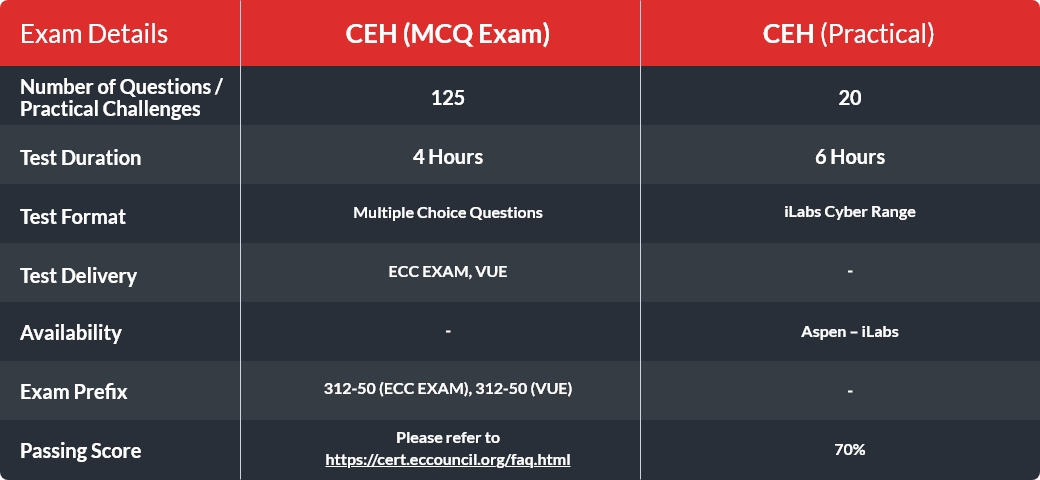
Personal
USD $720 / iLearn Kits
- 1 Year Full Access on Video Training
- 6 Months Access to iLab Machines
- 1 Year Access on Book, Slides, and Materials
- 24x7x365 support
- Exam Voucher Included
- Certificate of Attendance
- 1-hour Free Consultation
- 5% OFF on 3+ Kits
Groups Purchases
Starts from 5 iLearn Kits
- All Personal Package
- The best option for Institutions, Universities, Companies, Organizations, and Startups
- 7% OFF on 5+ Kits
- 10% OFF on 10+ Kits
- 12% OFF on 15+ Kits
- 15% OFF on 20+ Kits
- 25+ Kits Contact us
iLearn Kits
Additional Promotion
- CLICK+ Members get 5% OFF on All Kits
- Students will get 5% OFF on All Kits
- Instructors will get 5% OFF on All Kits
- Offers can NOT be transferred to 3rd party
- Max 2 Offers will be applied to Purchases
We provide Training and Certification for all levels
* All Prices are in USD including:
- One Year Access Training Videos
- 6 Month Access iLab and Scenario
- Certificate Exam Voucher
- Certificate of Attendance
- Online Exam
- Books, Slides and Course Material
- 24X7X365 Support
Core
Security Principal and Cyber Awareness
- CND – Certified Network Defender $720
- CSCU – Certified Secure Computer User $130
- ECES – EC-Council Certified Encryption Specialist $400
- ECSS – EC-Council Certified Security Specialist $400
Advanced
Hands-On Experience on Cybersecurity
- CEH – Certified Ethical Hacker $720
- CEH Practical $200
- APT – Advanced Penetration Testing $400
- LPT – Licensed Penetration Tester $999
- CSA – Certified SOC Analyst $400
- ECSA – EC-Council Certified Security Analyst $720
- ECSA Practical $250
- CPM – Certified Project Management $270
Expert
Need more? Don’t worry, we’re here.
- CHFI – Computer Hacking Forensic Investigator $720
- ECIH – EC-Council Certified Incident Handler $400
- CTIA – Certified Threat Intelligence Analyst $400
- EDRP – EC-Council Disaster Recovery Professional $720
- CBP – Certified Blockchain Professional $720
- CASE .NET Certified Application Security Engineer $390
- CASE JAVA Certified Application Security Engineer $390
- CCISO – Certified Chief Information Security Officer $830

Frequently Asked Questions
Questions about the C|EH Program
EC-Council places great emphasis on the quality of its instructors. A 17-year-old will not be teaching security to professionals at our accredited training centers. Certainly, the experience is the greatest teacher. However, EC-Council adheres to a code of ethics and encourages security professionals with significant years of teaching experience in the industry and security background to handle our security-related courses.
The Ethical Hacking and Countermeasures course prepare candidates for the CEH exam offered by EC-Council. The course focuses on hacking techniques and technologies from an offensive perspective. This advanced security course is regularly updated to reflect the latest developments in the domain, including new hacking techniques, exploits, automated programs as well as defensive recommendations as outlined by experts in the field. The CEH body of knowledge represents detailed contributions from security experts, academicians, industry practitioners, and the security community at large.
EC-Council believes in giving back to the security community as it has partaken of it. When you are a Certified Ethical Hacker, you are more than a security auditor or a vulnerability tester or a penetration tester alone. You are exposed to security checklists that will help you audit the organization’s information assets, tools that will check for vulnerabilities that can be exploited, and above all a methodology to assess the security posture of your organization by doing a penetration test against it. In short, the knowledge you will acquire has practical value to make your workplace a more secure and efficient one.
Consider this: A security defense course educates candidates regarding proper configuration, firewalls, or rather pre-emptive security.
CEH takes the alternative approach – defense in depth by attacking the systems. This is in sharp contrast to courses that teach defensive tactics alone. CEH imparts offensive tactics supplemented with defensive countermeasures. This ensures that the CEH professional can have a holistic security perspective of the organization.
Hacking techniques represent ways and means by which computer programs can be made to behave in ways they are not meant to. These techniques extend beyond the technology domain and can be applied to test security policies and procedures. Hacking technologies are used to refer to those tools and automated programs that can be used by perpetrators against an organization to incur critical damage. As technology advances, the skills required to execute a hack are much lesser as pre-compiled programs are available to effect havoc with a simple point and click.
Congratulations on becoming a CEH! You have joined an elite group of professionals around the world. Your next level is to become an EC-Council Certified Security Analyst (E|CSA) or proceed with the CEH (Practical).
C|EH Exam Policies
The CEH (ANSI) exam is an MCQ (Multiple Choice Question) exam. This exam is available at the ECC Exam Centre and the Pearson Vue Centre
The exam voucher code is valid for 1 year from the date of receipt.
For those attempting the exam at a physical testing center (ETC/ Pearson Vue), the exam will be proctored by a proctor authorized at the testing center.
For those attempting the exam remotely (ECC/ ProctorU), The exam will be proctored remotely by an authorized proctor.
This exam does not have a set passing score/ percentage, the number of items that you must answer correctly varies depending on the difficulty of the questions delivered when you take the exam. To understand how the scoring pattern works, visit the scoring section here.
Sessions should be booked at least 3 days in advance of the desired exam date.
Note: All exam sessions are proctored by the EC-Council Certification department.
C|EH General
EC-Council fulfills its social responsibility by ensuring that only persons with a minimum of two years of security-related experience are eligible for the course. In addition, all candidates are required to sign an agreement where they agree to respect the knowledge acquired and not misuse it in any way. The candidate also agrees to abide by all legal laws of their respective countries of residence in the use of this acquired knowledge. Besides the CEH exam is a tough one to pass as students must have in-depth knowledge to achieve the globally recognized ethical hacking certification.
Does it matter if an elite hacker writes a buffer overflow or a script kiddy runs a tool if the target system gets compromised anyway? The point here is that the enemy may be intellectually great or small, but he/she requires just one port of entry to wreck damage while the organization has the entire perimeter to guard with limited time and resources.
The ANSI accredited Ethical Hacking program is primarily targeted at security professionals who want to acquire a well-rounded body of knowledge to have better opportunities in this field. Acquiring a Certified Ethical Hacking Certification means the candidate has minimum baseline knowledge of security threats, risks, and countermeasures. Organizations can rest assured that they have a candidate who is more than a systems administrator, a security auditor, a hacking tool analyst, or a vulnerability tester. The candidate is assured of having both business and technical knowledge.
Once you are ready to proceed with your exam, please ensure you understand the below:
- You need to run an equipment test
- You need to carry an identification proof
- You should hold an valid exam voucher
Yes, the CEH (ANSI) is a part of the EC-Council Continuing Education Scheme.
The value of CEH lies in its practical value. Over 18 domains, students are exposed to business risks and the potential damage that can occur due to negligence. Students will be able to make an informed decision regarding the amount of risk a company can face if it chooses to address a security concern.
Frame your Future with CLICK+
EC-Council iLearn solution helps you to get trained with the latest techniques and skills in Cybersecurity domains. Click Plus professional team members always proud to help you find the best pathway of your training to promote your future. Wherever you are in your career, we are here to help!

